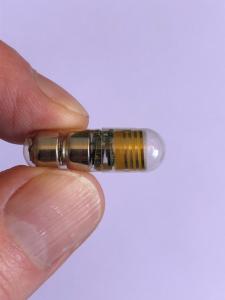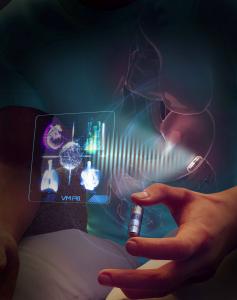Celero Announces Publication of First-in-Human Trial of an Ingestible Vitals Monitoring Pill
Study results show first time respiration and cardiac rate have successfully been monitored within humans from an ingestible device
Ingestible electronics have come a long way since their first use in the early 1950s in trials to evaluate pH, temperature and pressure. Since then, ingestible devices have routinely been used for temperature measurement as well as video capsule endoscopy. Ingestible electronics have the potential to transform how patients are diagnosed and treated across many conditions. Celero Systems is developing an ingestible capsule that can reside within the stomach for a week and monitor respiratory rate (RR), heart rate (HR), core body temperature, GI motility and movement. The Celero Vitals Monitoring Pill was tested in two use cases that have significant clinical challenges, specifically opioid-induced respiratory depression (OIRD) and polysomnography (PSG, sleep study) evaluations.
In 2022 the CDC reported over 100,000 deaths due to the deepening opioid crisis. Contributing to the opioid overdose death rate is that 63% occur when the individual is alone. Current rescue therapies require a third party deliver the medication so both the President’s Commission and Stanford-Lancet commission call for the development of a system that can autonomously deliver an opioid antagonist when OIRD is detected. Celero Systems is developing the first autonomous solution meant specifically for the patient: a once-a-week capsule that monitors for OIRD and autonomously delivers an opioid antagonist to reverse the effects of the overdose. Furthermore, the capsule will provide continuous unobtrusive monitoring and daily reports to the patient/primary care giver alerting of any clinical events requiring intervention.
Obstructive sleep apnea (OSA) involves partial or complete obstruction of the upper respiratory airway. Sleep apnea is traditionally diagnosed in a sleep lab in a procedure called a polysomnography (PSG) exam requiring a patient be hooked up to numerous sensors for vitals monitoring. While PSGs are the gold standard in diagnosing sleep apnea, the number of labs are limited and confined to larger populated areas, and in-clinic tests do disturbs the patient’s sleep. Home sleep tests allow for wider access but require the patient to do their own hook up to the monitor. Celero System’s capsule will provide easy access including in rural areas, while providing an unobtrusive method of diagnosing sleep apnea in the comforts of the patient’s home with multi-day reports.
Vital Signs monitoring results
In the study reported in Device, researchers have shown the ability to safely measure over extended periods of time respiratory and cardiac rate in swine models. In one swine model, the Celero System’s Pill accurately measured OIRD in a pig. Taking these encouraging results in animal studies, Celero developed the Vitals Monitoring Pill (VM Pill) and with the West Virginia Rockefeller Neurological Institute conducted its first-in-human feasibility study enrolling patients undergoing PSG studies to swallow the VM Pill prior to the PSG study and comparing the results against the gold standard PSG study monitors.
“It's an exciting intervention to help people be diagnosed and then receive the appropriate treatment if they suffer from obstructive sleep apnea,” says Giovanni Traverso, an associate professor of mechanical engineering at MIT and a gastroenterologist at Brigham and Women’s Hospital. “The device also has the potential for early detection of changes in respiratory status, whether it's a result of opiates or other conditions that could be monitored, like asthma or chronic obstructive pulmonary disease (COPD).”
In a study of 10 human volunteers, the researchers showed that the Pill can be used to monitor vital signs and to detect sleep apnea episodes, which occur when the patient repeatedly stops and starts breathing during sleep. The patients did not show any adverse effects from the Pill, which passed harmlessly through the digestive tract.
"Using the Celero Pill, we successfully measured respiratory rate (RR) and cardiac rate (CR) continuously over five hours per patient using the VM Pill, and the data showed high concordance with the PSG data" says Dr. Ali Rezai, Director of West Virginia Rockefeller Neurological Institute where the sleep studies were conducted. “West Virginia is ground zero for the opioid epidemic and we here at RNI pride ourselves in conducting groundbreaking research, such as this one with Celero Systems, to bring the next wave of therapy to millions suffering from the opioid crisis.”
“By teaming up with Dr. Traverso and Dr. Langer and their expertise in ingestible technologies, and the support of the clinical staff at WVU RNI, Celero Systems is well positioned to move forward the exciting work we are doing to bring a fully autonomous ingestible pill capable of monitoring for over a week a patient’s vitals signs and delivering medication as needed” says Benjamin Pless, CEO of Celero Systems. “We look forward to our next study at WVU RNI where we will begin testing the Celero System’s pill with a residency mechanism allowing it to reside in a patient’s stomach for a week.”
In future work, the researchers will incorporate an overdose reversal agent such as nalmefene into the device, so that therapy could be triggered when the person’s breathing rate slowed or stopped. Celero is also working on strategies to lengthen the amount of time that the capsule could remain in the stomach.
“The work so far is an important first step in the development an innovative diagnostic and therapeutic platform that can potentially benefit many patients, not just those suffering from respiratory conditions like OIRD or sleep apnea, but also patients with a range of cardiovascular and other conditions” according to Dr. Jeremy Ruskin, co-founder of Celero and Founder and Director Emeritus of the Cardiac Arrhythmia Service at Massachusetts General Hospital and Professor of Medicine at Harvard Medical School.
Craig Patterson
Celero Systems, Inc
email us here
Legal Disclaimer:
EIN Presswire provides this news content "as is" without warranty of any kind. We do not accept any responsibility or liability for the accuracy, content, images, videos, licenses, completeness, legality, or reliability of the information contained in this article. If you have any complaints or copyright issues related to this article, kindly contact the author above.



